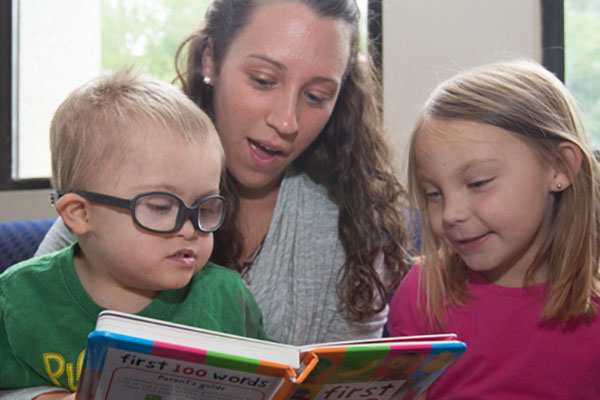BOONE, N.C. — This fall, Appalachian State University students will have increased opportunities to study American Sign Language (ASL) through the university’s new minor in ASL.
In fall 2019, Appalachian began offering ASL courses at the intermediate level, which fulfills the foreign language requirement for certain bachelor’s degrees and has increased student interest and enrollment in ASL courses.
Dr. Gail S. Donaldson, chair of the Department of Communication Sciences and Disorders (CSD) housed in Appalachian’s Beaver College of Health Sciences (BCHS), said the ASL minor is open to all undergraduate students, and she anticipates approximately 20 students will be enrolled in the minor during its first year.
Though the majority of the required courses needed for the minor already exist, the department created one new course — called Deaf Culture — that will be taught for the first time in spring 2021. This course goes beyond ASL and examines the historical, educational, linguistic and social aspects of Deaf culture.
Donaldson, who also serves as Appalachian’s Blue Cross Blue Shield of North Carolina Distinguished Professor, said the department created the minor based on student requests and a survey of students enrolled in ASL courses.
Beyond sign language
Dr. Greta Knigga-Daugherty, lecturer in the CSD department, said her students quickly realize ASL is “more than signing with the hands” as they learn about Deaf culture and the Deaf community.
“Although most people learn ASL to communicate with the Deaf community or with hearing people who are nonverbal, many people find learning ASL benefits them in other ways and sometimes in unpredictable ways,” Knigga-Daugherty said.
Knigga-Daugherty said students learn to understand and relate to other people by studying body language and eye contact.
Madison Fournier, a junior majoring in communication sciences and disorders with a minor in ASL from Knightdale, said, through her ASL studies, she has learned important components of how to effectively communicate with someone in the Deaf community. For instance, it is critical to maintain eye contact, to make sure the signer is visible to everyone in the conversation and to give visual feedback that you understand what is being signed, Fournier explained.
She also noted that to effectively initiate a conversation, you should wave your hand, flash a light or tap the person on the shoulder to get their attention.
“Many students pick up on social nuances that they never noticed or realized before,” Knigga-Daugherty said.
Fournier said ASL helps to “visualize concepts and builds complex language development separate from what a verbal language can.”
What do you think?
Share your feedback on this story.
About the Beaver College of Health Sciences
Appalachian State University’s Beaver College of Health Sciences (BCHS), opened in 2010, is transforming the health and quality of life for the communities it serves through interprofessional collaboration and innovation in teaching, scholarship, service and clinical outreach. The college enrolls more than 3,600 students and offers 10 undergraduate degree programs, nine graduate degree programs and four certificates across seven departments: Kinesiology, Nursing, Nutrition and Health Care Management, Public Health, Recreation Management and Physical Education, Rehabilitation Sciences, and Social Work. The college’s academic programs are located in the Holmes Convocation Center on App State’s main campus and the Levine Hall of Health Sciences, a state-of-the-art, 203,000-square-foot facility that is the cornerstone of Boone’s Wellness District. In addition, the college supports the Appalachian Institute for Health and Wellness and has collaborative partnerships with the Wake Forest University School of Medicine’s Physician Assistant Program, UNC Health Appalachian and numerous other health agencies. Learn more at https://healthsciences.appstate.edu.
About Appalachian State University
As a premier public institution, Appalachian State University prepares students to lead purposeful lives. App State is one of 17 campuses in the University of North Carolina System, with a national reputation for innovative teaching and opening access to a high-quality, cost-effective education. The university enrolls more than 21,000 students, has a low student-to-faculty ratio and offers more than 150 undergraduate and 80 graduate majors at its Boone and Hickory campuses and through App State Online. Learn more at https://www.appstate.edu.






![How NCInnovation Is Rethinking Economic Development in North Carolina [faculty featured]](/_images/_posts/2026/02/rethinking-economic-development-600x400.jpg)






